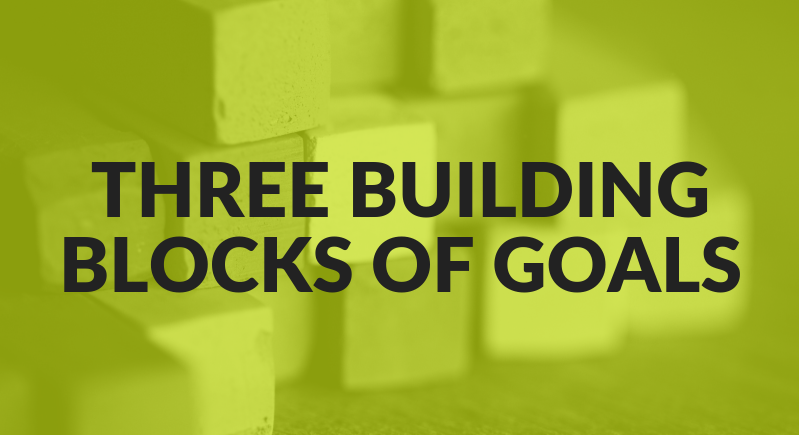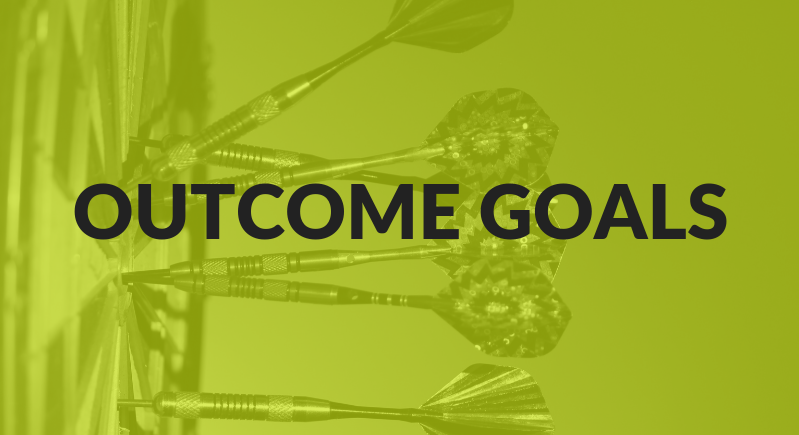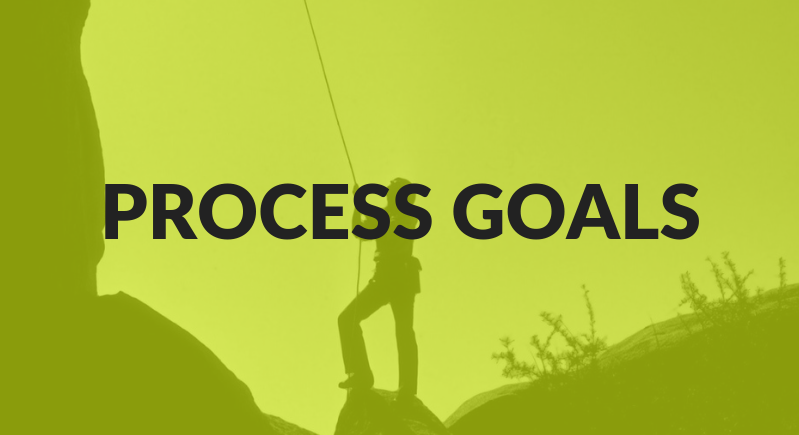The Ultimate Guide To Setting Goals
Goals. Who needs them?
Without direction we are destined to meander here and there, not knowing where we might end up. Or perhaps even worse, we might actually just stay in the same place. There are many people who are suggesting that goals are unnecessary - that they only lead to disappointment, or push us so hard that we lose sight of what’s actually most important. But this assumes that our goals are crazy-big, and that they are win-at-all-costs projects that take over our lives. They assume that goals are about career and money and material achievement, or running a marathon and pushing ourselves beyond what is considered reasonable. But what if goals were simpler than that? What if they were not only tied to these things, but also things that helped us live fulfilling lives and grow as human beings?
In the 21st Century, goals have become more important, not less. Because without a guiding light, we are not just rudderless, we are also at the whim of multiple currents, winds and wakes from other vessels. These find us in the form of day to day busy-work, distractions, social media, emails and instant gratification. Without goals, these things push and pull us in so many directions that we just continue to ‘do stuff’ as opposed to doing important stuff…. stuff that fulfils us.
When we become reactive, scientists call this ‘bottom up processing’ - we react to whatever is around us and we just do things because they are there. However, when we are more directed and intentional about what we do, we call this ‘top down processing’ - we have a goal and we deliberately do things to get closer to that goal.
But why can’t we just ‘do our best?”
Your best isn't enough
We’re all doing our best, and for a lot of people - that’s the problem!
Over the course of many years, researchers have set out to determine if our default strategy of just ‘doing your best’ is actually useful. Their experiments usually go like this:
They pick a task - let’s say its processing forms on a computer screen. They give one group of people a target to hit - let’s say its 30 forms an hour. They give a second group no target to hit at all. Instead, they are simply told to ‘do your best.’
What happens? The group with the target of 30 forms per hour performs better every time. Even if the target is set low, the group with the measurable goal performs better. They don’t seem to slack off once they’ve hit their target either - they use it for fuel to keep out-performing.
Think about the areas where you really need to be at your best - important parts of your work, your health, your home life, family and friends - and let’s see if 'doing your best' is actually working for you.
Where are you investing your time?
Here’s a simple thought experiment:
Think of the top three things that are most important to you and write them down if you want to. What would be on your list?
- Your health?
- Your family?
- Your happiness and fulfilment?
- Your career?
Now look back at your diary for the last week or so. How much focus and effort did you devote to getting closer to these things that are most important? Be careful here - I said focus and effort - not how much time did you devote to them. These are different concepts. We might not have a hell of a lot of time to devote to some things, but how much focus and effort do we apply? Focus and effort would mean that you plan, set goals, actively work towards these things, on a regular basis.
For most people, unfortunately, there is a significant difference between what is most important to them and what actually gets their time, attention, focus and effort. Other things, distractions, get in the way. This is where goals become important.
So, what goals should you set?
No one knows, but you. But what we can tell you is that you should have goals that fulfil you and help you perform at your best. And to do that, we need to look at what are called the Three Critical Areas.
The Three Critical Areas – Work, Home and Relationships, and Self
If you’ve read our articles on work life balance, then you’ll already understand the Three Critical Areas.
All the research on performance shows us that to be successful, we need to balance our performance across three critical areas of life - Work, Home and Relationships, and Self. Work is self-explanatory, as is the area of Home and Relationships. The area of Self represents our own physical, mental and emotional well-being, as well as our own personal goals. Our overall performance and fulfilment hinges on us taking care of these three areas, so naturally we need goals in each of them to stop us from just living a reactive ‘bottom up’ existence.

In our work with athletes and across different work environments, we’ve been able to refine how we set goals so that we give ourselves maximum chance of achieving them and staying motivated to do the things that get us closer. This process shows us that Goals should have three components.
- Outcome Goals - these provide our ‘guiding light’ and give us a benchmark to achieve. They can provide motivation when we take the time to think of them and what our ‘future selves’ would look like if we achieved them.
- Process Goals - these are our day-to-day ‘how to’ goals that create routine and symbolise our journey. These are often the most important goals that people can set.
- Sprint Goals - these are short sub-goals that keep us motivated and show us short term progress, which is far more motivating for us than long term progress that is often hard to see.

DO THIS: Build Your Outcome Goals in the three critical areas
This seems like a simple exercise, but most people find it quite hard. We need to create clarity, by setting our Outcome Goals in each of the three critical areas over the next twelve months or so (the time frame is up to you, but we suggest no less than six months). The hardest part is that you are only allowed to pick one item in each area. If you focus on more than this, things don’t get done and it becomes hard to prioritise. If you are going to commit to being intentional about where you spend your time, this is where it all starts.
Focus on the things that really matter - the areas where you really want to win - and be relentless in doing those things brilliantly.
Key elements of an Outcome Goal are as follows:
- You have to care about it - if it doesn’t move you, it won’t motivate you
- It has to be an outcome - things you want to achieve, not things you have to do to
- It has to be aspirational - something you aspire to, not something you’re already doing
- It has to have a verb - a doing word, an action, like ‘increase’
- It must be within your control
So let’s take a look at the three areas.
Work
What are the big things you want to achieve at work? You might want to ask your manager about this. Unless they honestly motivate you, please don’t just resort to the same old KPI’s that you are given by your boss. Think about the future and get clarity around your future-self at work and see this as a vision. If you’re self-employed, these might be Outcome Goals for the business, or if you are a manager, they might be for your team.
Here are some questions to get you thinking:
- Where do I see myself in one or two years’ time?
- With no limits placed on my situation or current skills, what would I most want to achieve at work?
- With no limits placed on my situation or current skills, what job would I like to have?
- What does the future of my role/team/business/industry look like?
- What are the big things that will take my team/business to the next level?
- What do I really enjoy and what motivates me?
Some examples of good work Outcome Goals:
- Position myself for a promotion
- Increase sales (you might want to put a figure on this)
- Grow new clients
- Develop my staff
- Build leadership skills.
Some examples of poor work Outcome Goals:
- Get a promotion - this isn’t always in your control. The opportunity might not arise.
- Sales - no verb; what do you want to do with Sales?
- Spend more time with clients - this is something you want to do rather than something you want to achieve. Maybe the Goal should be ‘Improve Client Relationships’ - spending time with clients doesn’t always translate into better relationships or sales
Home and Relationships
One of the big reasons we never set ‘goals’ in this area is because they sound fluffy and immeasurable. Don’t worry about these things - we’ll deal with that later. You might want to be a great dad, get back in touch with some friends, or be a better role model for your family or community. Maybe you’ve been working so hard you’ve lost touch with some relationships or maybe you just squeeze your home and relationships area in between everything else and you’d like to improve the quality of the time you spend with those you love.
Some questions to get you thinking:
- Are any relationships being neglected?
- What would I like my relationships to be like in five years’ time, and what do I need to start doing about it?
- Are my home finances in order?
- How would I like to be perceived as a father/mother/son/daughter/spouse?
Some examples of good Home and Relationship Outcome Goals:
- Be a fantastic father/mother/wife/husband etc.
- Re-build relationships with friends/family
- Improve my relationship with my spouse
Some examples of poor Home and Relationship Outcome Goals:
- Spend more time with the kids - this is something you do, rather than an outcome. The outcome might be ‘Improve my relationships with my kids’
- Have one ‘date night’ with my spouse per month - as above, this is a component of something you do, rather than an outcome. The Outcome Goal might be ‘Be a great husband/wife.’
- Family Time - this has no verb, so creates no action.
Self
What are the things that you personally want to achieve for yourself? Do you want to complete some study or focus on your health and fitness? These are the personal endeavours that you want to undertake. They should include things like you own physical, mental, emotional health, self-esteem, personal goals.
Some questions to get you thinking:
- What would I like to accomplish, just for myself?
- What would make me feel good about myself and my abilities?
- What areas of physical and emotional health need my attention?
- What do I need to do to stay stimulated mentally?
- What can I change that will get me closer to my ideal future-self?
Some examples of good self Outcome Goals:
- Improve my health
- Learn to control my emotions
- Complete my study
- Improve my leadership skills
Some examples of poor Self Outcome Goals:
- Stop getting angry - you are better to have an Outcome Goal that is about doing something, rather than stopping something. The alternative might be ‘Learn to control my emotions’
- Study more - this might be ok, but if you did no study last year and this year you study for an hour, then you achieve this goal, but is that what you really want?
- Leadership - as per the other examples, there is no verb so no call to action.
Each Outcome Goal should have a timeframe for completion and preferably a measurement. Some things will be measurable - most likely your Work and Self goals, but the Home and Relationship goals rarely are. Don’t worry - we’ll cover that later on.
For now, find some time, some inspiration and a blank sheet of paper and go ahead and think about what these Outcome Goals might be for you. I think you will find that just creating this clarity will have an enormous impact on the ways you choose to spend your time over the coming weeks.
Once you’re done, you’re going to notice one glaring problem: they are too far away in the future. And when things are too far in the future, they stop motivating us. So, how we can hack the system?
The Problem with the Future
Research on New Year’s resolutions is a good indicator of the average person’s level of self-control. As expected, on the first of January every year (or about that time) about 70% of people make some sort of new year’s resolution. Unfortunately for 85% of those people, their good intentions are in tatters only six weeks later. What energised us in January has already lost its influence in only a few short weeks.
So what does keep us motivated? Things that have two components: Urgency and Immediate Reward.
To solve this, people usually chunk their goal down into short- or medium-term milestones, which we’ll explore a little later. But setting short-term goals by themselves rarely works. Let’s be honest, human nature dictates that if we say we will do something by the end of the month, then chances are we will go 25 days before we get really focused on it. Even if something is two weeks away we’ll often wait at least a week (and, let’s be honest, probably more like ten days) before we stop those ‘right now’ tasks and start to give it some of our attention.
To create urgency, we need to have an even shorter timeframe, that’s where Process Goals become important. 
Outcome Goals are great for some things and terrible in other respects. Our success or failure cannot always be tied to these outcomes. Sometimes we can achieve our Outcome Goals, but we don’t actually win. Other times we can NOT achieve our Outcome Goals, but have performed brilliantly.
For example, you can have a goal to lose weight, and then get sick and lose five kilograms. You may achieve your Outcome Goal, but it wasn’t healthy and maybe you didn’t do any of the things that you needed to do. Your Outcome Goal could be to hit a sales target at work, and you could get one deal that lands in your lap without trying and saves your whole year. If you’re an athlete you might say you want to win a certain event, but there might just be someone who is better than you.
In each of these cases, our outcome isn’t always the best judge of our performance.
And this is just one of the reasons why Process Goals are so important.
Process Goals are the things we can DO on a weekly basis which help get us closer to our Outcome Goals. If we structure these properly, they will provide the motivation we need to keep us on track, and the right amount of stress to keep us in the Performance Zone. By building these habits, they become a natural part of our everyday activity and we begin to change behaviours.
By understanding these Process Goals, it shows us the most important things to do on a daily or weekly basis and gets us clear about what will make the biggest impact.
The important thing is that we need to do them AT LEAST once a week, and preferably three or four times a week.
But Process Goals need some very specific attributes, or they simply won’t work to keep you on track and keep you inspired. They won’t challenge your hardwiring unless they are:
- Big impact behaviours,
- Repetitive, and
- Measurable
Big impact behaviours are (sometimes small) things that get you a lot closer to your Outcome Goals. We can do a million things that make a small difference, but we need to find the few things that make a big difference. Think of it in these terms: if you could only do one thing each week that got you closer to your Outcome Goal, what would it be? That’s an indication of the impact they need to make.
The reason they need to be repetitive is because that’s how we form habits. We need to look for things that we can do daily or weekly. Doing something once a month - or even once every two weeks - won’t be enough to change our behaviours or build the habits that we need.
Now, they also need to be measurable. You should clearly be able to show whether they have been done or not. Saying ‘be a good leader’ isn’t necessarily measurable, but to say ‘I’ll do one-on-one coaching with each of my team members each week’…now that’s something you can say that you have definitively done or not.
DO THIS: Building Your Process Goals
For each of your Outcome Goals that you developed earlier, list one Process Goal that you need to do every day, or every week. Remember, the more often you can do them, the better.
You can probably think of 20 things that you can do to achieve your Outcome Goals, but if you actually want to deliver on those things, if you want to maintain self-control, build habits that help you continually improve, then you need to narrow this down.
Again, you can only have one Process Goal for each Outcome Goal, so make sure you choose the behaviours that have the biggest impact. Here are some examples of Process Goals in our three critical areas:
Work Outcome Goal - Increase Sales
Process Goal - make three new sales calls each week
Home and Relationships Outcome Goal - Be a Great Dad
Process Goal - spend one hour each night focused on kids, uninterrupted by technology
Self Outcome Goal - Improve Health and Fitness
Process Goal - complete four exercise sessions each week, minimum 30 minutes duration
Examples of poor Process Goals:
- Make more sales calls - you may have only made one sales call for the whole of last year. If you make two this year, is that ok? Probably not. Be more specific.
- Focus on kids - what does this mean? Do you read one book to them? Do you have dinner with them? Again, be more specific and make sure that your Process Goal actually has a big impact and gets you closer to your Outcome Goal.
- Exercise seven times a week every morning - this is ok but can be better. What constitutes exercise? Does walking to the shop to get a coffee count? Probably not. Also, this Process Goal is actually too specific. If you miss one day, then you can’t complete your seven sessions, so you might be tempted to just give up for the rest of the week. And if you have a week where you actually can’t exercise in the morning, then you might be likely to forget about this all week, because you decide it’s impossible.
Process Goals have to be as specific as possible otherwise you let yourself off the hook. As humans, we hate to say that we failed. Instead, we look to find ways to say that we executed these Process Goals even if we didn’t. If you’re not specific, you’ll convince yourself that it’s ok because you actually have made more sales calls than last year (even though it’s still not enough).
When Process Goals are set properly, we can create enough urgency week to week or day to day. But to create instant rewards, we need to take this a step further.
Accountability and Progress
There are two other sub-components or secondary drivers that appeal to our hardwiring as well. They are:
- Accountability
- Making Progress
Not only does Accountability give us a deadline, but someone is going to hold me to that deadline. Making Progress is about being able to see that you are moving forward. If you put in all this effort and you don’t see progress, you’re likely to give up.
So, now that we understand this, we need to be able to apply these principles to managing our new Process Goals,. Here are some suggestions.
Make a Progress Chart
This is a really simple but highly effective method to keep those Process Goals on track. Let’s say your Process Goal is to exercise three times a week for 30 minutes each. Simply get a piece of paper and set it out like this:
Process Goal: Exercise three times a week

Of course, if you have our Focus Planner, then this is already taken care of in your habit tracker contained in the weekly spread.
Each time you complete the behaviour, simply tick the box. This seems ridiculously easy, but it does a few really clever things
First, it creates some urgency. It shows you what you need to get done during the week and if, by Thursday, there are no ticks in the boxes, then it will create some urgency for completion.
Secondly, it shows us a sense of progress and achievement. As silly as it sounds, we humans love to tick boxes and cross things off lists. This small sense of accomplishment is enough to give us a little shot of that much-loved reward chemical, dopamine.
Not only do you want to build the new habits of your Process Goals, you also want to build the habit of reviewing your progress and holding yourself accountable. Remember, we tend to focus our attention on things that are regularly reviewed and things that hold us accountable.

Finally we come to Sprint Goals.
Sprint Goals are a combination of interim Outcome Goals, as well as Process Goal execution. But they take these concepts and put them into short term challenges that we can have against ourselves to keep us motivated, accountable and on-track.
The easiest timeframe for a Sprint Goal is a month - but it can actually be anything you want. Some people find it better to do two-week Sprint Goals because it keeps them more motivated, but it will also depends on when you expect to see progress.
Let’s look at two examples of Sprint Goals. And for ease of understanding, we’ll make them last one month each:
Example 1: Self Goal: Health
Outcome Goal: Lose 8kg of body fat by September 30
Process Goal 1: Exercise 5 days a week, 30min minimum
Process Goal 2: Consume 1800 calories 6 days a week
Sprint Goal for April: Lose 1.5kg, execute all Process Goals
Accountability and Progress Chart:
Example 2: Home and Relationships Goal: Financial
Outcome Goal: Save $5,000 for Holiday by end of year
Process Goal 1: Take lunch to work 5 days a week to save money
Process Goal 2: Transfer $15 lunch money to savings account 5 days a week
Sprint Goal for May: $2400 in savings account, execute all Process Goals
Accountability and Progress Chart:
You can do this on a spread sheet, or on a piece of paper stuck to the fridge or you can use the blank pages of your Focus Planner to make it happen. Whatever you do, make sure it is somewhere you can see it and constantly have it as a reminder. 

A FINAL WORD ON THE JOURNEY
Making goals is easy, but sticking to them is hard. If you really want to change, you need to make sure your Goals have the right aspects to motivate you and keep you on track. By breaking up your general goals into these three elements - Outcomes, Processes and Sprints - you give yourself the best chance of change.
There is a saying “becoming is better than being.” And for goals, this is a philosophy we need to adopt. Every high performer that we have worked with falls in love with the process. They enjoy the journey, and the challenge of executing those Process Goals each and every week. Following this path not only helps us achieve our goals, but helps us transform as a person.
Successfully sticking to behaviour change requires us to do more than say “I’m going to lose weight” or “I’m going to save money.” It requires us to shift our perspective on who we are. We need to say: “I am a person who exercises almost every day,” or “I am a person who is sensible with my money.” Becoming this person - our ‘future self’ .. but right now, in the present - is the single thing that changes behaviours and builds habit more effectively than any other strategy.
So we leave you with this simple question: who do you want to be?
** Tony Wilson is a Workplace Performance Expert. His insights into performance science and its application in the workplace will make you re-think the way that you approach leadership, culture change, high performance and productivity. Tony has an MBA and a BSc majoring in physiology and delivers workshops and keynote presentations around the globe.
